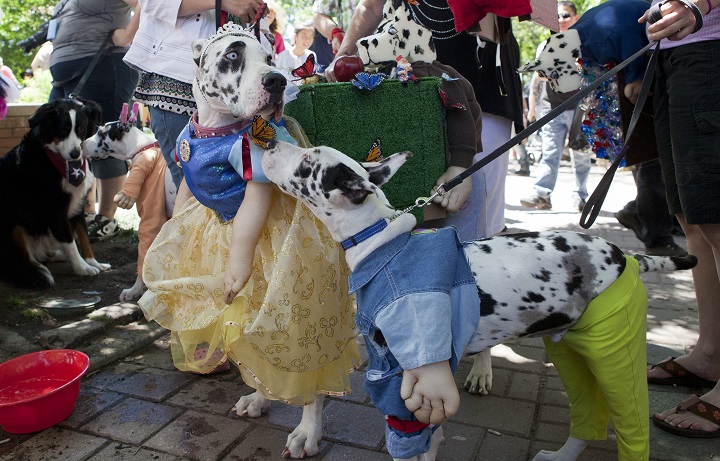TORONTO – One day, sterilizing your pet could be as simple as taking them to the vet for their annual shots.

For Dr. Judith Samson-French – who jokingly calls herself “the queen of contraception” – a less-invasive alternative to putting Felix or Fido under the knife should be an option that any veterinarian in Canada could offer.
Contraceptives for cats and dogs are not commercially available in Canada, but Samson-French has special access to one drug for a project aimed at controlling stray dog populations in remote First Nations communities.
The vet from Bragg Creek, Alta., injects a contraceptive implant – about the size of a grain of rice – and a microchip to track the dog.
READ MORE: Pets & Pals: The training of a service dog
Deslorelin, which she has access to through an emergency drug release, costs $55 and has been found to last over a year with no side effects, she said.
So far, about 300 dogs in four communities, three in Alberta and one in Labrador, have been treated, said Samson-French. There are plans for similar projects in British Columbia, Manitoba and Nunavut.
An alternative to surgery is needed because it’s difficult to provide veterinary care in remote areas for free-roaming dogs, she said.
They can also pose a danger to children. Two girls were mauled to death by wild dogs in Manitoba this year.
Samson-French said the drug is commercially available in Europe, Australia and New Zealand, but not in North America.
- Several baby products have been recalled by Health Canada. Here’s the list
- ‘Super lice’ are becoming more resistant to chemical shampoos. What to use instead
- Is home ownership only for the rich now? 80% say yes in new poll
- Invasive strep: ‘Don’t wait’ to seek care, N.S. woman warns on long road to recovery
“I would love to have that available in private practice for dogs,” she said.
In Europe, non-permanent contraceptives are used on female show dogs, said Samson-French. It stops them from going into heat during competitions, but they can still be bred after they earn their qualifications.
It may be expensive for a company to try to get the drug approved in Canada, but it’s already been tested in the field and “works beautifully,” she said.
Deslorelin suppresses the production of reproductive hormones, said Joyce Briggs, president of the U.S.-based Alliance for Contraception in Cats and Dogs.
There’s also work being done on developing a vaccine which would trigger an immune response against the gonadotropin-releasing hormone – what she calls the “master hormone” – which puts the whole reproductive cycle in motion.
Zeuterin, which sterilizes dogs when injected into the testicles, is available in the United States. Samson-French said a drug called GonaCon is showing promise as a contraceptive for cats.
“We’re looking at health care for animals that is following the progress of health care for people,” Briggs said in an interview from Portland, Ore.
“We certainly wouldn’t think about managing population with an ovarian hysterectomy for women and castration for men.”
Many pet owners would likely welcome a less invasive option to surgery if they had any inkling that there was another option that was less invasive, she said.
She still believes that pets should be spayed and neutered and volunteers with a group in the Portland area that provides thousands of cat spays for low-income families.
“I’m very much an advocate for it. But I’ll tell you, when I’m about to take my own animals in for the surgery, I always feel bad for them,” Briggs said.
“And if there was an alternative where I could bring them in, have them not go under anaesthesia and just get a shot, I think that would be great.”





Comments